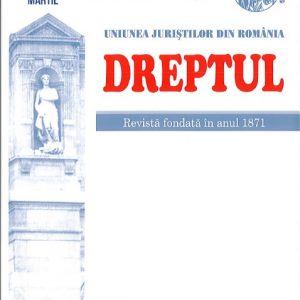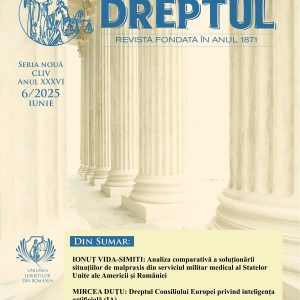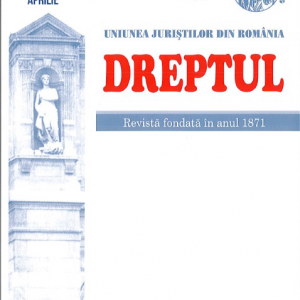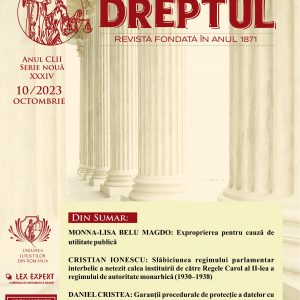-
 In the last decades, administrative law underwent a phenomenon of didactic fragmentation which nobody can ignore today. Numerous monographies within the doctrine of public law, whose purpose – stated in their own titles – is to treat, from multiple perspectives and in a more or less profound manner, (very) narrow subjects of administrative law, have invaded the book market. It happened not only in Romania, but also in France, a country which reasonably claims to be the homeland of administrative law as a branch of law, and therefore as a teaching subject, in its current European continental approach. This literary explosion went hand in hand with an unprecedented proliferation of master studies specializations offered by higher education institutions, in the area of administrative law and/or public administration. Are these phenomena able to fragment the theoretical discourse of administrative law in such a way that this subject loses its unity and, hence, ideological identity? Most likely not. The model proposed by us – that of the five ideological foundations of administrative law – seems to have the ability to prevent the undesirable result hereabove mentioned. With these five ideological foundations – the public administration, the public authority, the public service, the public interest and the public power – almost all the defining and descriptive equations of the major institutions of administrative law (such as the civil service, the public domain, the public enterprise, the unilateral administrative act, the administrative contract, the administrative litigation and public authorities’ financial liability for damage caused by their illegal acts) are likely to be solved. And if this is possible, then the idea of ideological unity/identity of the administrative law is safeguarded, despite the didactic fragmentation previously envisaged.
In the last decades, administrative law underwent a phenomenon of didactic fragmentation which nobody can ignore today. Numerous monographies within the doctrine of public law, whose purpose – stated in their own titles – is to treat, from multiple perspectives and in a more or less profound manner, (very) narrow subjects of administrative law, have invaded the book market. It happened not only in Romania, but also in France, a country which reasonably claims to be the homeland of administrative law as a branch of law, and therefore as a teaching subject, in its current European continental approach. This literary explosion went hand in hand with an unprecedented proliferation of master studies specializations offered by higher education institutions, in the area of administrative law and/or public administration. Are these phenomena able to fragment the theoretical discourse of administrative law in such a way that this subject loses its unity and, hence, ideological identity? Most likely not. The model proposed by us – that of the five ideological foundations of administrative law – seems to have the ability to prevent the undesirable result hereabove mentioned. With these five ideological foundations – the public administration, the public authority, the public service, the public interest and the public power – almost all the defining and descriptive equations of the major institutions of administrative law (such as the civil service, the public domain, the public enterprise, the unilateral administrative act, the administrative contract, the administrative litigation and public authorities’ financial liability for damage caused by their illegal acts) are likely to be solved. And if this is possible, then the idea of ideological unity/identity of the administrative law is safeguarded, despite the didactic fragmentation previously envisaged. -
 Examining the impact of the entry into force of the new Romanian Civil Code (Law no. 287/2009, republished, effective since October 1st 2011) the author concludes that, despite the “monistic” nature of the new Code, the commercial legal relationship still exists (but grounded on the concepts of business and professional). So being, says the author, commercial law remains timely even though its legal basis is within the new Civil Code. Therefore, to avoid misleading foreign investors, one suggests changing certain legal texts of legal acts implementing the new Civil Code, de lege ferenda, for the purpose of restoring the traditional concepts of “company”, “commercial agreements”, “legal relationships / commercial disputes”.
Examining the impact of the entry into force of the new Romanian Civil Code (Law no. 287/2009, republished, effective since October 1st 2011) the author concludes that, despite the “monistic” nature of the new Code, the commercial legal relationship still exists (but grounded on the concepts of business and professional). So being, says the author, commercial law remains timely even though its legal basis is within the new Civil Code. Therefore, to avoid misleading foreign investors, one suggests changing certain legal texts of legal acts implementing the new Civil Code, de lege ferenda, for the purpose of restoring the traditional concepts of “company”, “commercial agreements”, “legal relationships / commercial disputes”. -

-
 In this article, the author proposes to analyze the place and role of the constitutional law in the legal system, starting from the object of regulation of its norms: establishing the modalities of organization and functioning of the state and, within these, the forms of exercising and transmission of the powers through democratic electoral procedures, as well as of the fundamental rights and freedoms of citizens. The constitutional law has received in doctrine a wide range of definitions in the doctrine, all authors emphasizing the quality of constitutional law to underlie the structuring of the national legal order, in the sense that all branches of law reside, at the level of general principles, in the constitutional law. The author states that the constitutional law norms are meant to protect and capitalize the most general interests of the society and of the state, as well as the fundamental values of a politically organized human community geographically located on a determined territory. Due to its structural role in the organization and functioning of the system of law, constitutional law sets guidelines for the other branches of law, takes over from these norms to which it is conferred the legal force of a constitutional norm and thus contributes to the shaping of a pyramidal hierarchy of norms of law depending on their legal force. At the bottom of the pyramid it is placed the Constitution, to which all the other norms of law are subordinated. The author also deals with the constitutionalization of the law, a process that results from the extension of the constitutional regulation of some social relations reserved by tradition to other branches of law.
In this article, the author proposes to analyze the place and role of the constitutional law in the legal system, starting from the object of regulation of its norms: establishing the modalities of organization and functioning of the state and, within these, the forms of exercising and transmission of the powers through democratic electoral procedures, as well as of the fundamental rights and freedoms of citizens. The constitutional law has received in doctrine a wide range of definitions in the doctrine, all authors emphasizing the quality of constitutional law to underlie the structuring of the national legal order, in the sense that all branches of law reside, at the level of general principles, in the constitutional law. The author states that the constitutional law norms are meant to protect and capitalize the most general interests of the society and of the state, as well as the fundamental values of a politically organized human community geographically located on a determined territory. Due to its structural role in the organization and functioning of the system of law, constitutional law sets guidelines for the other branches of law, takes over from these norms to which it is conferred the legal force of a constitutional norm and thus contributes to the shaping of a pyramidal hierarchy of norms of law depending on their legal force. At the bottom of the pyramid it is placed the Constitution, to which all the other norms of law are subordinated. The author also deals with the constitutionalization of the law, a process that results from the extension of the constitutional regulation of some social relations reserved by tradition to other branches of law. -

-
 In this study has been underlined that the right to property is a fundamental component of Human Rights, of the European and International Rights of every human being. Have been put forward the main scientific contributions in the European Culture of Human Rights and has been demonstrated in which manner the right to property is guaranteed in the European practice and in Romania after 1989. It is underlined that the normal life of every human being is not possible in the absence of those guarantees that his right to property is fully respected.
In this study has been underlined that the right to property is a fundamental component of Human Rights, of the European and International Rights of every human being. Have been put forward the main scientific contributions in the European Culture of Human Rights and has been demonstrated in which manner the right to property is guaranteed in the European practice and in Romania after 1989. It is underlined that the normal life of every human being is not possible in the absence of those guarantees that his right to property is fully respected. -
 According to the relevant legal literature, public property and private property are the two typical – indeed, the only – manifestations of the same subjective right. For this reason, public property rights are stereotypically defined, in a manner analogous to how we define the right to private property, as the interfusion of the three classical elements (powers) of property – usus, fructus, and abusus – which are understood to be exclusive, absolute and perpetual. Moreover, it is claimed that the private appropriation of goods does not boil down to individual property, and that the collective appropriation of goods is mediated by the State, which is the legal expression of the community’s collective will. These ideas are not free from criticism. The three powers of property coalesce to define an act of exclusion, and one which necessarily presupposes an individualistic slant to the legal construction of property. By giving account of itself in such a way, this species of subjective right cannot, while also remaining true to itself, be private in certain cases, and public in others. The exclusive right to property, precisely because it is conceived to be exclusive, presupposes and individual owner. In doing so, it precludes any form of collective ownership. Therefore the legal framework within which public property is currently defined reveals a powerful internal contradiction, which is not without practical consequence. For these reasons, the right of public ownership, being what it now is, cannot truly be a means to the collective appropriation of goods by the community. And this is because any form of collective ownership cannot be compatible with „all” the exclusionary and discretionary powers afforded to the individual proprietor by the private right of ownership.
According to the relevant legal literature, public property and private property are the two typical – indeed, the only – manifestations of the same subjective right. For this reason, public property rights are stereotypically defined, in a manner analogous to how we define the right to private property, as the interfusion of the three classical elements (powers) of property – usus, fructus, and abusus – which are understood to be exclusive, absolute and perpetual. Moreover, it is claimed that the private appropriation of goods does not boil down to individual property, and that the collective appropriation of goods is mediated by the State, which is the legal expression of the community’s collective will. These ideas are not free from criticism. The three powers of property coalesce to define an act of exclusion, and one which necessarily presupposes an individualistic slant to the legal construction of property. By giving account of itself in such a way, this species of subjective right cannot, while also remaining true to itself, be private in certain cases, and public in others. The exclusive right to property, precisely because it is conceived to be exclusive, presupposes and individual owner. In doing so, it precludes any form of collective ownership. Therefore the legal framework within which public property is currently defined reveals a powerful internal contradiction, which is not without practical consequence. For these reasons, the right of public ownership, being what it now is, cannot truly be a means to the collective appropriation of goods by the community. And this is because any form of collective ownership cannot be compatible with „all” the exclusionary and discretionary powers afforded to the individual proprietor by the private right of ownership. -
 In this study, the author, having regard to the provisions of Directive 98/5/EC of the European Parliament and of the Council of 16 February 1998, as well as to the jurisprudential situations in this matter of the Court of Justice of the European Union, in the end comes to the conclusion that, in case a Romanian citizen obtains the professional qualification in one of the Member States of EU (or of the European Economic Area or of Switzerland), other than Romania, and he wants to practise in Romania, under the professional title thus acquired, the Romanian legal regulations referring to this legal classification (in this case, of Chapter VIII of the Law No 51/1995 on the organization and practice of the profession of lawyer) will become applicable.
In this study, the author, having regard to the provisions of Directive 98/5/EC of the European Parliament and of the Council of 16 February 1998, as well as to the jurisprudential situations in this matter of the Court of Justice of the European Union, in the end comes to the conclusion that, in case a Romanian citizen obtains the professional qualification in one of the Member States of EU (or of the European Economic Area or of Switzerland), other than Romania, and he wants to practise in Romania, under the professional title thus acquired, the Romanian legal regulations referring to this legal classification (in this case, of Chapter VIII of the Law No 51/1995 on the organization and practice of the profession of lawyer) will become applicable. -

-
 A holistic analysis of a branch of law often tends to assert its autonomous character and to confirm punctually particularities, exceptions and derogations. Starting from this premise, an inventory of the financial law institutions reveals, indeed, the same autonomy. A closer analysis reveals unsuspected, masterfully built networks of communication between the financial law and the other branches of law. This communication is not eminently delimitative, but confirms our intuition announced in the title of the transversal vocation of the financial law. This conductive behaviour is confirmed on a horizontal axis, related to the national normative space, but also on an extremely consistent vertical axis in the normative framework of the European Union.
A holistic analysis of a branch of law often tends to assert its autonomous character and to confirm punctually particularities, exceptions and derogations. Starting from this premise, an inventory of the financial law institutions reveals, indeed, the same autonomy. A closer analysis reveals unsuspected, masterfully built networks of communication between the financial law and the other branches of law. This communication is not eminently delimitative, but confirms our intuition announced in the title of the transversal vocation of the financial law. This conductive behaviour is confirmed on a horizontal axis, related to the national normative space, but also on an extremely consistent vertical axis in the normative framework of the European Union. -
 After the First World War, six different systems of civil law were enforced in Greater Romania. The conflicts among these systems were settled through interprovincial law, carved by scholars and jurisprudence according to the Private international law template. This paper aims to present the choice-of-law rules and the jurisdiction grounds of the Romanian interprovincial law. The choice-of-law rules were organized according to the following principles: the status and capacity of persons were subjected to the law of the domicile of origin, movables and real estates were governed by lex rei sitae and the formal validity of legal act was subjected to the place where the act was concluded. The effects of acquired rights were subjected to the local law. Their enforcement was governed by lex loci executiones. Only the exclusive jurisdiction rules of the local law ought to be observed by the judge. For the rest of the jurisdiction rules, the local judge had to follow the jurisdictional grounds provided in the Civil Procedure Code of the Old Kingdom of Romania. The judicial decisions delivered in one province were enforced without exequatur in the other provinces.
After the First World War, six different systems of civil law were enforced in Greater Romania. The conflicts among these systems were settled through interprovincial law, carved by scholars and jurisprudence according to the Private international law template. This paper aims to present the choice-of-law rules and the jurisdiction grounds of the Romanian interprovincial law. The choice-of-law rules were organized according to the following principles: the status and capacity of persons were subjected to the law of the domicile of origin, movables and real estates were governed by lex rei sitae and the formal validity of legal act was subjected to the place where the act was concluded. The effects of acquired rights were subjected to the local law. Their enforcement was governed by lex loci executiones. Only the exclusive jurisdiction rules of the local law ought to be observed by the judge. For the rest of the jurisdiction rules, the local judge had to follow the jurisdictional grounds provided in the Civil Procedure Code of the Old Kingdom of Romania. The judicial decisions delivered in one province were enforced without exequatur in the other provinces. -
 If any person can admire his own image without any restriction, then anyone is free to fix his/her image by reproduction in different forms (self-portrait, autosculpture, etc.) and finally the image can be exploited by reproduction (here by the question of whom belongs the product of the image, how it can be exploited, who owns the good in the image, how to exploit its image). The central point of the work is the exploitation of the image of persons and goods. We will try to find out what is the legal basis of image protection depending on its subject. In this way, a leap forward will be made in the legal regulation of the right to image followed by a doctrinal and jurisprudential approach to the law that is invoked to protect the image of the goods. We will also try to capture the need for a distinct right to protect the image of goods by correlating it with the mechanism of regulating the right to image of the individual.
If any person can admire his own image without any restriction, then anyone is free to fix his/her image by reproduction in different forms (self-portrait, autosculpture, etc.) and finally the image can be exploited by reproduction (here by the question of whom belongs the product of the image, how it can be exploited, who owns the good in the image, how to exploit its image). The central point of the work is the exploitation of the image of persons and goods. We will try to find out what is the legal basis of image protection depending on its subject. In this way, a leap forward will be made in the legal regulation of the right to image followed by a doctrinal and jurisprudential approach to the law that is invoked to protect the image of the goods. We will also try to capture the need for a distinct right to protect the image of goods by correlating it with the mechanism of regulating the right to image of the individual.
